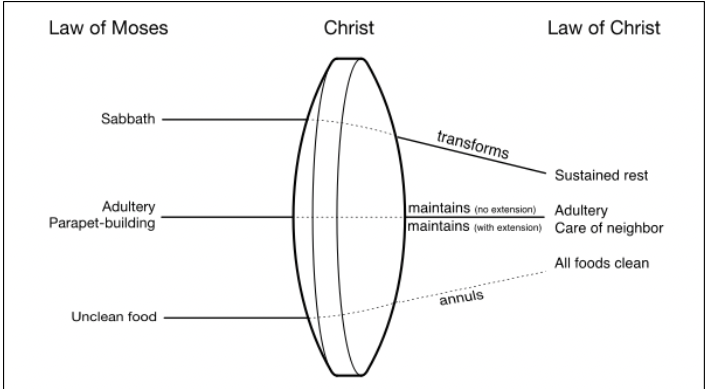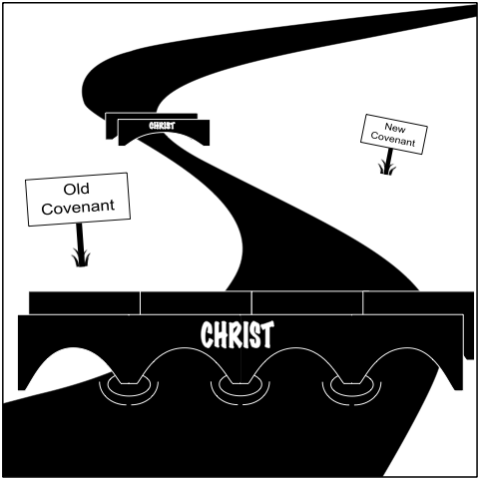“The Coastlands Wait for His Law” (Isa 42:4)
The previous post provided two examples of how Moses’s law can apply to new-covenant members through Christ and for Christ. There, we saw that Christ’s work can maintain the law with or without extension. This post considers how Christ’s coming transforms or annuls old-covenant instruction.
Case Study #3: The Law Transformed
Considering the Sabbath command in Deuteronomy 5:12–15 will show us how important it is to consider Christ’s fulfillment, which in this instance fully transforms the law and guides those strong in faith in the path of love.
Observe the Sabbath day, to keep it holy, as the Lord your God commanded you. Six days you shall labor but the seventh days is a Sabbath to the Lord your God. On it you shall not do any work, you or your son or your daughter or your male servant or your female servant, or your ox or your donkey or any of your livestock, or the sojourner who is within your gates, that your male servant and your female servant may rest as well as you. You shall remember that you were a slave in the land of Egypt, and the Lord your God brought you out from there with a mighty hand and an outstretched arm. Therefore the Lord your God commanded you to keep the Sabbath day..
Table 1. Deuteronomy 5:12–15
1. Establish the Original Meaning and Application of Deuteronomy 5:12–15
In Deuteronomy’s version of the Ten Commandments (or Ten Words), discourse features create five groupings of long and short commands that highlight the centrality of the Sabbath within the old covenant:
| Word 1 | Have no other gods | Deut 5:5-10 | Commanding Grouping #1: Long |
| Word 2 | Bear Yahweh’s name | Deut 5:11 | Commanding Grouping #2: Short |
| Word 3 | Observe the Sabbath | Deut 5:12-15 | Commanding Grouping #3: Long |
| Word 4 | Honor parents | Deut 5:16 | Commanding Grouping #4: Short |
| Word 5 | Love neighbor | Deut 5:17-21 | Commanding Grouping #5: Long |
Table 2. The Centrality of the Sabbath in the Decalogue
At the center of Israel’s identity was the Sabbath, which stood as the old covenant’s “sign” (Exod 31:13, 17). Michael Fox notes three functions of OT signs:
- Proof signs demonstrated the truth of something.
- Symbol signs represented a future reality by virtue of resemblance or association.
- Cognition signs aroused knowledge of something by identifying or reminding.
The Sabbath served first as a cognition sign and then as a symbol sign, symbolically identifying Israel and reminding it of its calling as the agent through whom God’s sovereignty would be celebrated on a global scale (ultimately through its Messiah).
The entirety of the old covenant was symbolized in the Sabbath, and its importance is highlighted by the fact that breaking it was a criminal offense (Num 15:32–36). While Sabbath was part of criminal law, its symbolism (like that of the dietary laws addressed in the next case study) suggests that it was also ceremonial law.
2. Determine the Theological Importance of Deuteronomy 5:12–15
The Sabbath command teaches us many things about God: (1) Yahweh shows no partiality. (2) Yahweh gives his people opportunities to test their trust and to develop their dependence. (3) Yahweh is passionate to display right order in his world, wherein he is exalted as Sovereign over all things.
Considering how Christ fulfills the Sabbath, we recall that Jesus saw himself as the source of ultimate rest: “Come to me, all who labor and are heavy laden, and I will give you rest” (Matt 11:28). Directly after this assertion, Jesus allows his disciples to pluck grain on the Sabbath and then declares himself “lord of the Sabbath” (12:8). Jesus’s redeeming work fulfilled Israel’s global Sabbath mission and inaugurated the end-times Sabbath rest for the world.
The love principle standing behind Deuteronomy 5:12–15 is this: Loving God and neighbor required carrying out the 6 + 1 pattern of life as a witness to the kingdom hope of ultimate rest.
3. Summarize the Lasting Significance of Deuteronomy 5:12–15
Until the final judgment, God will retain his commitment to his people, even those the world considers “least.” As we look out for the marginalized among his people, we serve King Jesus (Matt 25:31–40). Furthermore, the Sabbath command reminds us of our own need to rest, by which God graciously counters workaholism and nurtures deeper levels of trust in him (Ps 127:2).
Additionally, we must maintain a pattern of corporate worship (Heb 10:25), and Sunday is a natural time for this (Acts 20:7; 1 Cor 16:2) due to its end-times significance as the day on which God ignited his new creation (Rom 6:4; 1 Cor 15:20; Rev 14:4). But corporate worship on another day of the week is not sin, nor is it wrong to weed your garden, study for an exam, or engage in sports on a Sunday—so long as you don’t replace grace (1 Cor 15:10; Phil 2:12–13; Col 3:17, 23). Through Christ, God has transformed the Sabbath in a way that believers now enjoy his sovereign rest seven days a week.
Case Study #4: The Law Annulled
This final illustration of applying OT law to Christians addresses a command that Christ’s coming annuls—yet in such a way that we can still benefit from it.
You shall therefore separate the clean beast from the unclean, and the unclean bird from the clean. You shall not make yourselves detestable by beast or by bird or by anything with which the ground crawls, which I have set apart for you to hold unclean. You shall be holdy to me, for I the Lord am holy and have separated you from the peoples, that you should be mine.
Table 3. Leviticus 20:25–26
1. Establish the Original Meaning and Application of Leviticus 20:25–26
Pre-fall, God’s prohibition of eating from a certain tree supplied a context for humankind to mature in wisdom (Gen 2:17; cf. 3:5). The first couple disobeyed, and the result was that God cursed the world and marked certain creatures as unclean (7:2–3). Originally, the clean-unclean distinction appears to have only guided sacrifices (8:20; 9:3–4). However, it eventually served to distinguish God’s people from the nations (Lev 20:25–26). Either way, it was vital within Israel’s religious life (10:10).
Unclean creatures shared some commonality with the serpent’s curse or death-causing activities. Because Israel’s neighbors were the serpent’s offspring (see Gen 3:15), the meaning Israel associated with unclean animals paralleled God’s perspective of the nations. Accordingly, Yahweh’s prohibition against eating unclean animals symbolically distinguished Israel from its neighbors. It also allowed Israel to point the world to Yahweh as the only Savior who could overcome curse with blessing (Gen 12:3; 22:18).
2. Determine the Theological Importance of Leviticus 20:25–26
God is holy, and all should see and celebrate this. John Hartley notes that, within the old covenant, dietary restrictions “made the Israelites conscious at every meal that they were to order their lives to honor the holy God with whom they were in covenant.” So, for example, the prohibition against eating pork served to heighten the Israelites’ awe of Yahweh and to distinguish them from those outside the covenant.
With the progression of salvation history, however, Jesus has declared “all foods clean” (Mark 7:19). Accordingly, it is not what goes into peoples’ mouths but what comes out of their hearts that defiles them (7:18–23). Similarly, the Lord gave Peter a vision of unclean animals, commanded him to “kill and eat,” and then asserted, “What God has made clean, do not call common” (Acts 10:10–15). This instruction proved to Peter that God was now welcoming any from the nations who would fear and obey him (10:34–35).
Within the original OT context, then, loving one’s neighbor by not eating unclean food means that Israel was to display God’s holy animosity toward sin and the curse even in their diet.
3. Summarize the Lasting Significance of Leviticus 20:25–26
When considering how eating today relates to loving our neighbors, we must view it from two angles. First, love of neighbor means that those who are strong in faith and who feel free to eat anything must be careful not to cause those who are weaker in faith and who choose to abstain from certain foods to stumble. As Paul writes, “Food will not commend us to God. We are no worse off if we do not eat, and no better off if we do. But take care that this right of yours does not somehow become a stumbling block to the weak” (1 Cor 8:8–9; cf. Rom 14:2, 13–15).
Second, love of neighbor means that we will not stop proclaiming that Christ has triumphed on our behalf, opening the door for all peoples to stand reconciled to him. One way we can do this is by eating creatures God once prohibited. Whereas old-covenant believers abstained from these foods to proclaim and mirror God’s holiness, new-covenant believers today can partake of them for the same purposes (1 Cor 10:31). Within this framework, bacon is victory food!
A Note on the Hebrew Roots Movement
For centuries, many Jewish followers of Christ have chosen to follow Jewish customs like eating kosher food, worshiping on Saturday, and welcoming the Sabbath with a traditional ceremony and meal. They recognize this as a free choice, not as an obligation to Moses’s law or rabbinic tradition. And Paul would bless this practice, especially if the intent is to see more Jews saved (see 1 Cor 9:20).
However, there is a growing “Hebrew Roots” movement whose primarily Gentile devotees claim Jesus’s followers need to return to their Messiah’s roots by keeping as much of the OT law as possible without the temple. While they verbally affirm that justification before God is by grace alone through faith alone in Jesus alone, they teach that all believers are still bound to keep the Mosaic law.
Reflecting on this movement in light of Scripture, we can say that Hebrew Roots advocates are, at best, passing undue judgment on fellow believers (Rom 14:3) and, at worst, failing to appreciate the changes that Christ brought in salvation history (Gal 3:1–5). Whether dealing with food (2:11–14), holy days (4:10), or circumcision (5:2), all who require obedience to the law as if Christ has not come are seeking to “submit again to a yoke of slavery” (5:1). We cannot keep the whole law (5:3), so we must trust Christ, who has fulfilled the law for and through his elect as we live lives of love by the Spirit (Rom 5:18; 8:3–4; 13:8–10).
¹Michael V. Fox, “The Sign of the Covenant: Circumcision in the Light of Priestly ’ôt Etiologies, Revue biblique 81 (1974): 562–63.
²J. E. Hartley, “Holy and Holiness, Clean and Unclean,” in Dictionary of the Old Testament: Pentateuch, ed. T. Desmond Alexander and David W. Baker (Downers Grove, IL: InterVarsity, 2003), 429.
This blog series summarizes Jason S. DeRouchie’s forthcoming book, Delighting in the Old Testament: Through Christ and for Christ (Wheaton, IL: Crossway, 2024). You can pre-order your copy here.



